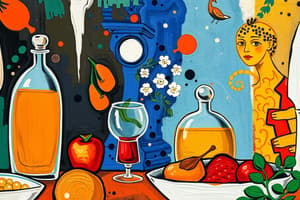Podcast
Questions and Answers
¿Qué representa la gastronomía en la sociedad moderna?
¿Qué representa la gastronomía en la sociedad moderna?
- Una sola disciplina
- Una intersección compleja de varias disciplinas (correct)
- Un campo puramente científico
- Una disciplina que no ha evolucionado
¿Qué contribuyó al surgimiento de movimientos contemporáneos como Slow Food?
¿Qué contribuyó al surgimiento de movimientos contemporáneos como Slow Food?
- La industrialización de la alimentación
- El aumento de la importancia de la alta cocina
- La globalización y los cambios ambientales (correct)
- Los avances en biotecnología
¿Qué reflejó la publicación del Opusculum de Arte Coquinaria de Bartolomeo Scappi durante el Renacimiento?
¿Qué reflejó la publicación del Opusculum de Arte Coquinaria de Bartolomeo Scappi durante el Renacimiento?
- El declive de la importancia de las artes culinarias
- La falta de diversidad en las recetas
- Un enfoque exclusivo en la aristocracia
- La creciente importancia de las artes culinarias en la vida cotidiana (correct)
¿Cuál es una característica distintiva de las escuelas profesionales dedicadas a la gastronomía?
¿Cuál es una característica distintiva de las escuelas profesionales dedicadas a la gastronomía?
¿Qué permiten los avances en biotecnología en relación con la gastronomía?
¿Qué permiten los avances en biotecnología en relación con la gastronomía?
¿Qué aspecto de la gastronomía medieval se destaca en el texto?
¿Qué aspecto de la gastronomía medieval se destaca en el texto?
¿Cuál es una característica clave de la gastronomía antigua mencionada en el texto?
¿Cuál es una característica clave de la gastronomía antigua mencionada en el texto?
¿Qué reflejan los libros como 'Le Ménagier de Paris' en relación con la gastronomía medieval?
¿Qué reflejan los libros como 'Le Ménagier de Paris' en relación con la gastronomía medieval?
¿Cuál es una característica común en las civilizaciones antiguas griegas y romanas mencionada en el texto?
¿Cuál es una característica común en las civilizaciones antiguas griegas y romanas mencionada en el texto?
¿Por qué es útil comprender las raíces y evolución de la gastronomía según el texto?
¿Por qué es útil comprender las raíces y evolución de la gastronomía según el texto?
Flashcards are hidden until you start studying
Study Notes
Gastronomy is the art of human food preparation, cooking, and presentation. It encompasses the study of how and why people eat the foods they do, including cultural, economic, social, and historical factors. To fully appreciate gastronomy, it's helpful to understand its origins and evolution through time. Here, we delve into some key aspects of gastronomy's history, exploring how our understanding and appreciation of cuisine has evolved over centuries.
Ancient Gastronomy
The earliest forms of codified recipes and written works on culinary arts can be traced back to ancient civilizations like the Greeks and Romans. In these societies, books such as Apicius' cookbook from the 5th century AD reflect the existence of organized systems of preparing and consuming food. These early works often focus on techniques and ingredients, providing insights into the culinary practices of their respective eras.
Medieval Gastronomy
In medieval times, cookbooks were typically associated with high society, often serving religious communities or royal households. A notable example is Le Ménagier de Paris, a French text from 1393 which provides detailed instructions on household management, including matters pertaining to the kitchen. This period saw a growing interest in exotic ingredients and spices, thanks to expanded trade networks.
Renaissance and Early Modern Period
During this era, a shift occurred towards creating cookbooks for a more diverse audience, moving away from the aristocratic realm and becoming accessible to urban dwellers and even townsfolk. An illustrative example is Bartolomeo Scappi's Opusculum de Arte Coquinaria, the first Italian cookery book published during the Renaissance period. This work reflects the increasing importance of culinary arts in everyday life.
Modern Era and Beyond
As globalization progressed, so did the spread of ideas about food and dining etiquette. Culinary education became institutionalized, leading to the establishment of professional school programs. One interesting institution dates back to the 1870s and is located in Lyon, France — La Martinière, now known as Lycée Saint-Vincent, is considered the world's oldest vocational school dedicated to hospitality and gastronomy.
Today, gastronomy continues to evolve alongside social, cultural, technological, and environmental changes. We see this reflected in contemporary movements such as Slow Food, which emphasizes sustainability, local production, and traditional cooking methods. Additionally, advances in biotechnology have allowed us to explore new frontiers regarding food safety, nutrition, and flavor engineering.
In essence, gastronomy represents a complex intersection of various disciplines: history, anthropology, sociology, economics, technology, ecology, and aesthetics. By studying its development throughout history, one can gain insight into how cultures have shaped their eating habits and culinary traditions, and furthermore, anticipate where gastronomy might lead in the future.
Studying That Suits You
Use AI to generate personalized quizzes and flashcards to suit your learning preferences.




